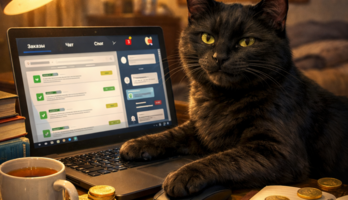flynn_gillian_gone_girl (1) (858987), страница 12
Текст из файла (страница 12)
Nick, Nick, Nick!I took repeated tugs on the bottle, psyching myself up for sleep, a losing routine.Sleep is like a cat: It only comes to you if you ignore it. I drank more and continued mymantra. Stop thinking, swig, empty your head, swig, now, seriously, empty your head, do itnow, swig.
You need to be sharp tomorrow, you need to sleep! Swig. I got nothing morethan a fussy nap toward dawn, woke up an hour later with a hangover. Not a disablinghangover, but decent. I was tender and dull. Fuggy. Maybe still a little drunk. I stutterwalked to Go’s Subaru, the movement feeling alien, like my legs were on backward. Ihad temporary ownership of the car; the police had graciously accepted my gently usedJetta for inspection along with my laptop—all just a formality, I was assured.
I drovehome to get myself some decent clothes.Three police cruisers sat on my block, our very few neighbors milling around. NoCarl, but there was Jan Teverer—the Christian lady—and Mike, the father of the threeyear-old IVF triplets—Trinity, Topher, and Talullah. (“I hate them all, just by name,”said Amy, a grave judge of anything trendy.
When I mentioned that the name Amy wasonce trendy, my wife said, “Nick, you know the story of my name.” I had no idea whatshe was talking about.)Jan nodded from a distance without meeting my eyes, but Mike strode over to me asI got out of my car. “I’m so sorry, man, anything I can do, you let me know. Anything. Idid the mowing this morning, so at least you don’t needta worry about that.”Mike and I took turns mowing all the abandoned foreclosed properties in thecomplex—heavy rains in the spring had turned yards into jungles, which encouraged anin ux of raccoons.
We had raccoons everywhere, gnawing through our garbage late atnight, sneaking into our basements, lounging on our porches like lazy house pets. Themowing didn’t seem to make them go away, but we could at least see them coming now.“Thanks, man, thank you,” I said.“Man, my wife, she’s been hysterical since she heard,” he said. “Absolutelyhysterical.”“I’m so sorry to hear that,” I said. “I gotta—” I pointed at my door.“Just sitting around, crying over pictures of Amy.”I had no doubt that a thousand Internet photos had popped up overnight, just to feedthe pathetic needs of women like Mike’s wife. I had no sympathy for drama queens.“Hey, I gotta ask—” Mike started.I patted his arm and pointed again at the door, as if I had pressing business. I turnedaway before he could ask any questions and knocked on the door of my own house.O cer Velásquez escorted me upstairs, into my own bedroom, into my own closet—past the silvery perfect-square gift box—and let me ri e through my things.
It made metense, selecting clothes in front of this young woman with the long brown braid, thiswoman who had to be judging me, forming an opinion. I ended up grabbing blindly:The nal look was business-casual, slacks and short sleeves, like I was going to aconvention. It would make an interesting essay, I thought, picking out appropriateclothes when a loved one goes missing. The greedy, angle-hungry writer in me,impossible to turn off.I jammed it all into a bag and turned back around, looking at the gift box on thefloor.
“Could I look inside?” I asked her.She hesitated, then played it safe. “No, I’m sorry, sir. Better not right now.”The edge of the gift wrapping had been carefully slit. “Has somebody looked inside?”She nodded.I stepped around Velásquez toward the box. “If it’s already been looked at then—”She stepped in front of me. “Sir, I can’t let you do that.”“This is ridiculous. It’s for me from my wife—”I stepped back around her, bent down, and had one hand on the corner of the boxwhen she slapped an arm across my chest from behind. I felt a momentary spurt of fury,that this woman presumed to tell me what to do in my own home.
No matter how hard Itry to be my mother’s son, my dad’s voice comes into my head unbidden, depositingawful thoughts, nasty words.“Sir, this is a crime scene, you—”Stupid bitch.Suddenly her partner, Riordan, was in the room and on me too, and I was shakingthem o — ne, ne, fuck—and they were forcing me down the stairs. A woman was onall fours near the front door, squirreling along the oorboards, searching, I assume, forblood spatter. She looked up at me impassively, then back down.I forced myself to decompress as I drove back to Go’s to dress.
This was only one in along series of annoying and asinine things the police would do in the course of thisinvestigation (I like rules that make sense, not rules without logic), so I needed to calmdown: Do not antagonize the cops, I told myself. Repeat if necessary: Do not antagonize thecops.I ran into Boney as I entered the police station, and she said, “Your in-laws are here,Nick,” in an encouraging tone, like she was offering me a warm muffin.Marybeth and Rand Elliott were standing with their arms around each other.
Middleof the police station, they looked like they were posing for prom photos. That’s how Ialways saw them, hands patting, chins nuzzling, cheeks rubbing. Whenever I visited theElliott home, I became an obsessive throat-clearer—I’m about to enter—because theElliotts could be around any corner, cherishing each other.
They kissed each other full onthe mouth whenever they were parting, and Rand would cup his wife’s rear as he passedher. It was foreign to me. My parents divorced when I was twelve, and I think maybe,when I was very young, I witnessed a chaste cheek kiss between the two when it wasimpossible to avoid. Christmas, birthdays. Dry lips. On their best married days, theircommunications were entirely transactional: We’re out of milk again. (I’ll get some today.)I need this ironed properly. (I’ll do that today.) How hard is it to buy milk? (Silence.) Youforgot to call the plumber. (Sigh.) Goddammit, put on your coat, right now, and go out and getsome goddamn milk.
Now. These messages and orders brought to you by my father, amidlevel phone-company manager who treated my mother at best like an incompetentemployee. At worst? He never beat her, but his pure, inarticulate fury would ll thehouse for days, weeks, at a time, making the air humid, hard to breathe, my fatherstalking around with his lower jaw jutting out, giving him the look of a wounded,vengeful boxer, grinding his teeth so loud you could hear it across the room.
Throwingthings near her but not exactly at her. I’m sure he told himself: I never hit her. I’m surebecause of this technicality he never saw himself as an abuser. But he turned our familylife into an endless road trip with bad directions and a rage-clenched driver, a vacationthat never got a chance to be fun. Don’t make me turn this car around.
Please, really, turnit around.I don’t think my father’s issue was with my mother in particular. He just didn’t likewomen. He thought they were stupid, inconsequential, irritating. That dumb bitch. It washis favorite phrase for any woman who annoyed him: a fellow motorist, a waitress, ourgrade school teachers, none of whom he ever actually met, parent-teacher conferencesstinking of the female realm as they did.
I still remember when Geraldine Ferraro wasnamed the 1984 vice presidential candidate, us all watching it on the news beforedinner. My mother, my tiny, sweet mom, put her hand on the back of Go’s head andsaid, Well, I think it’s wonderful. And my dad ipped the TV o and said, It’s a joke. Youknow it’s a goddamn joke. Like watching a monkey ride a bike.It took another ve years before my mother nally decided she was done. I camehome from school one day and my father was gone. He was there in the morning andgone by the afternoon. My mom sat us down at the dining table and announced, “Yourfather and I have decided it would be best for everyone if we live apart,” and Go burstinto tears and said, “Good, I hate you both!” and then, instead of running to her roomlike the script called for, she went to my mom and hugged her.So my father went away and my thin, pained mother got fat and happy—fairly fatand extremely happy—as if she were supposed to be that way all along: a de atedballoon taking in air.
Within a year, she’d morphed into the busy, warm, cheerful ladyshe’d be till she died, and her sister said things like “Thank God the old Maureen isback,” as if the woman who raised us was an imposter.As for my father, for years I spoke to him on the phone about once a month, theconversations polite and newsy, a recital of things that happened. The only question myfather ever asked about Amy was “How is Amy?,” which was not meant to elicit anyanswer beyond “She’s ne.” He remained stubbornly distant even as he faded intodementia in his sixties. If you’re always early, you’re never late. My dad’s mantra, and thatincluded the onset of Alzheimer’s—a slow decline into a sudden, steep drop that forcedus to move our independent, misogynistic father to a giant home that stank of chickenbroth and piss, where he’d be surrounded by women helping him at all times.
Ha.My dad had limitations. That’s what my good-hearted mom always told us. He hadlimitations, but he meant no harm. It was kind of her to say, but he did do harm. I doubtmy sister will ever marry: If she’s sad or upset or angry, she needs to be alone—she fearsa man dismissing her womanly tears. I’m just as bad. The good stu in me I got from mymom. I can joke, I can laugh, I can tease, I can celebrate and support and praise—I canoperate in sunlight, basically—but I can’t deal with angry or tearful women. I feel myfather’s rage rise up in me in the ugliest way.













